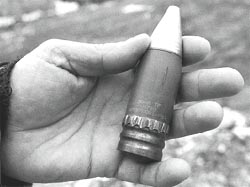The aftermath
 the Balkan war in 1999 has left a deadly impact on North Atlantic Treaty Organisation (nato) soldiers who were deployed in the region. A 14-member team of United Nations Environment Programme found evidence of radioactivity in eight of the eleven sites in Kosovo that was struck with depleted uranium (du) munitions during the war. This report came to light when seven Italian soldiers posted at the former Yugoslavia recently succumbed to cancer, out of which five died of leukaemia. They were reportedly exposed to radioactivity from the warheads. Another 30 Italian soldiers are currently in a critical condition.
the Balkan war in 1999 has left a deadly impact on North Atlantic Treaty Organisation (nato) soldiers who were deployed in the region. A 14-member team of United Nations Environment Programme found evidence of radioactivity in eight of the eleven sites in Kosovo that was struck with depleted uranium (du) munitions during the war. This report came to light when seven Italian soldiers posted at the former Yugoslavia recently succumbed to cancer, out of which five died of leukaemia. They were reportedly exposed to radioactivity from the warheads. Another 30 Italian soldiers are currently in a critical condition.
The death toll is rising. Two Dutch, two Spaniards, a Portugese, a Czech, all posted at the region also died of leukaemia. Five Belgian soldiers recently succumbed to a mysterious illness and a Red Cross worker also died from what has been commonly termed as the "Balkan Syndrome'. Four French soldiers are currently being treated for leukaemia. In many European countries, more soldiers who served as peacekeepers in the region are being screened.
Many world leaders have expressed concern about the deaths and have demanded an inquiry. German Chancellor Gerhard Schroder called on nato to investigate the links between the death and the radiation. However, the Pentagon denied any links between the radiation and the deaths. Mark Laity, special adviser to nato secretary-general, George Robertson, mentioned that there was no scientific evidence to prove that the munitions were linked to leukemia. "In general terms, the current state of medical opinion is that depleted uranium does not pose a health risk,' he said.
The problem could worsen as the un scientists said they had found remnants of the uranium-tipped ammunition still lying around. Some European countries including Germany and Italy have called for a moratorium on the use of uranium weapons. Following the incident, nato has announced that it will set up a crisis centre to exchange information on health risks from the depleted uranium munitions.
The us jets fired 31,000 rounds of the ammunition against the Serb during the 1999 war to drive the Yugoslav army out of Kosovo. Around 10,000 rounds were also fired in neighbouring Bosnia during 1994 and 1995. The World Health Organisation (who) has warned that children playing in former conflict areas where the weapons exploded could be at risk .
nato had issued warnings to its member states 18 months ago of a possible threat from the "Balkans Syndrome'. The Joint Chiefs of Staff issued a document called "hazard awareness' on July 1, 1999, that warned soldiers and civilians against coming in contact with the used ammunition. The document mentioned the need for personnel to wear protective masks and cover skin, they also mentioned the necessity for people involved in the more hazardous clearing tasks to undergo health assessments afterward.
Related Content
- Protecting maternal, newborn and child health from the impacts of climate change: call for action
- Evidence-based public–private collaboration in the health sector: the potential for collaborative governance to contribute to economic recovery from COVID-19 in Asia
- SDG 11: sustainable cities and communities
- South Asia’s path to resilient growth
- The cost of delay: why finance to address loss and damage must be agreed at COP27
- Improving social protection portability for migration-affected children: spotlight on Chhattisgarh
